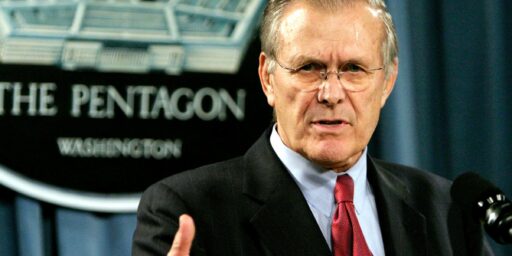Rumsfeld Bans Word “Insurgents”
Defense Secretary Don Rumsfeld has banned the use of the word “insurgents” to describe those murdering civilians in Iraq.
Rumsfeld Hasn’t Hit a Dead End in Forging Terms for Foe in Iraq (LAT)
The Pentagon’s long struggle over how to describe the war in Iraq moved to new ground Tuesday as Defense Secretary Donald H. Rumsfeld said he wanted to retire the term “insurgents” in favor of “enemies of the legitimate Iraqi government.” Rumsfeld, who has previously described the foe as “deadenders,” “former regime elements” and in other terms, told a Pentagon news conference that the insurgent label lent the enemy “more legitimacy than they seem to merit.” Iraqis now have a constitutional government that offers them legitimate means of political expression, and the foe lacks broad popular support, Rumsfeld argued.
“These people don’t have a legitimate gripe,” he said. “These people aren’t trying to promote something other than disorder…. This is a group of people who don’t merit the word ‘insurgency.’ ” According to the Merriam-Webster Online Dictionary, an insurgent is “a person who revolts against civil authority or an established government.”
This isn’t the first time the Pentagon has tried to retire such a term. Immediately after the U.S.-led invasion of Iraq in 2003, American military commanders referred to non-uniformed attackers as the “Saddam Fedayeen,” and then “regime death squads.” After the military declared an end to initial major combat operations in spring 2003, Rumsfeld began calling them “dead-enders” and “former regime loyalists.” When it was pointed out that the word “loyalists” might have too positive a connotation, the military began calling them “former regime elements.”
Dana Milbank’s take on this development is somewhat amusing:
Rumsfeld’s War On ‘Insurgents’ (WaPo, A18)
Last weekend, while other Americans were watching football and eating leftover turkey, Defense Secretary Donald H. Rumsfeld ended the Iraqi insurgency. It was easy, really: He declared that the insurgents would, henceforth, no longer be called insurgents.
“Over the weekend, I thought to myself, ‘You know, that gives them a greater legitimacy than they seem to merit,’ ” Rumsfeld, at a Pentagon briefing yesterday, said of his ban on the I-word. “It was an epiphany,” he added, throwing his hands in the air.
Encouraging reporters to consult their dictionaries, the defense secretary said: “These people aren’t trying to promote something other than disorder, and to take over that country and turn it into a caliphate and then spread it around the world. This is a group of people who don’t merit the word ‘insurgency,’ I think.”
Joint Chiefs of Staff Chairman Gen. Peter Pace, standing at Rumsfeld’s side, evidently didn’t get the memo about the wording change. Describing combat in Iraq, he paused and said, “I have to use the word ‘insurgent’ because I can’t think of a better word right now.”
“‘Enemies of the legitimate Iraqi government’ — how’s that?” Rumsfeld proposed.
“What the secretary said,” Pace continued, to laughter. But Rumsfeld’s new description — ELIG, if you prefer an acronym — didn’t stick with the general. Smiling, he uttered the forbidden word again while discussing explosive devices.
The secretary recoiled in mock horror. “Sorry, sir,” Pace explained. “I’m not trainable today.”
Rumsfeld is almost certainly right that “insurgency” is not the right term for foreign fighters murdering civilians. Pace’s problem, though, is the same that most of us have: the nature of the enemy in Iraq is sufficiently complicated that a single term for them is bound to be imprecise. There is an insurgency going on in Iraq but some substantial part of the killing is being done by people who are merely terrorists.
This topic has been well trod in the blogosphere. PoliBlog’s Steven Taylor had a piece about this topic (“What’s an Insurgent? What’s a Terrorist?“) at Tech Central Station well over a year ago.
Searching my archives for the term “insurgency” would be rather unproductive given that I’ve written hundreds of posts using the word, but one referenced in Taylor’s piece, “Words Mean Things: Insurgency” is a good starting point.
-
National War College professor Bard O’Neill, in his book Insurgency & Terrorism, defines the term thusly:
A struggle between a nonruling group and the ruling authorities in which the nonruling group consciously uses political resources (e.g., organizational expertise, propaganda, and demonstrations) and violence to destroy, reformulate, or sustain the basis of legitimacy of one or more aspects of politics (p. 13).
Dictionary.com simply defines it as
The action or an instance of rebellion; an insurrection.
Rather clearly, we’re fighting an insurgency in Iraq.
Connotatively, “insurgency” is a rather value-neutral term, unlike, say “terrorist.” It doesn’t confer legitimacy on those seeking to overthrow a government to call them insurgents. One can be a facist or Ba’athist and still be an insurgent. And, even if it was comprised entirely of former regime loyalists (which it isn’t, by a long shot) it would still be an insurgency, since it’s out of power and fighting to achieve control of the instruments of state.
Further, terminology isn’t necessarily mutually exclusive. These particular insurgencts are using guerilla warfare and terrorism as part of their campaign. And whether they consider themselves “freedom fighters” is really irrelevant in the labels applied. Terrorism is terrorism, regardless of the merits of one’s goals.
Given the vast number of foreign jihadists brought in by Zarqawi since I wrote those words, caveats are in order since those elements do not appear interested in governing Iraq.




What was wrong with the term “dead-ender”?
There’s no better way to allude to the future of those who blow up innocent civilians for no better reason than creating instability.
You said it yourself “These particular insurgencts are using guerilla warfare and terrorism as part of their campaign.”
A rational person can distinguish between “guerilla warfare” and “terrorism” as components of “insurgency.”
A rational person can also experience some frustration when a fragement is used to describe the whole.
Of course, this president and his core supporters are all about “revenge of the D students” and such logical •ò€ÃÂistency is not really part of the game plan.
odo: I would argue that the nature of the struggle has changed substantially since I wrote those words in June 2004. Notably, there is now an elected Iraqi government.
And who, exactly, are the “D students” in question? Bush was a mediocre undergrad, to be sure, although he did manage to get a Harvard MBA. Cheney and Rumsfeld, though, were brilliant students. To say nothing of Rice, whose intellectual accomplishments are rather impressive.
Are you saying “guerilla warfare†has ceased, and that “terrorism” targeting civilians is the only activity?
Of course not, because then US casualties would fall to zero.
The “D students” thing is my frustration at the level of debate. Like banning a freaking word … or calling someone a “Michael Moore” as the Whitehouse press secretary did … how, just infantile.
odo: No, I agree that there is both an insurgency underway that uses terrorism as part of its tactic, I just think there’s also a significant terrorist-only element that is doing most of the killing and that does not fit the traditional definition of “insurgent.”
I agree, too, on the Michael Moore thing and have said so. Unfortunately, it’s an outgrowth of the seemingly permanent campaign mode that both sides are in. That’s particularly problematic in the context of a war.
Finally, while I chide Rumsfeld on this to a large degree, I understand where he’s coming from. The fight to control the language of the debate is quite important, especially in a counter-insurgency operation. He’s going too far in saying there’s no insurgency but he’s right that it’s a label that doesn’t fit Zarqawi and Co.
I wouldn’t call this Iraqi govt any more elected than Saddam’s govt (who also ran fake elections showing himself as winner). It’s a puppet govt installed by US armed forced in a process overseen and manipulated to have exactly what they wanted. I would also agree that insurgents isn’t exactly the word to use, however it is neutral. I would strongly disagree with “enemies of the Iraqi govt”. I would call it more of a rebellion against the US and US loyalists. The enemy are rebels against our American empire. They have to use guerilla warfare and terrorist actions, because they are not powerful enough to use conventional means.
Just like the puppet government set up by Republicans in the “fake” elections in 2000 and 2004… …The Democrats have to use dirty politics , because they are not powerful enough to use conventional means…
“The Democrats have to use dirty politics”
The Democrats aren’t the ones being indicted under charges stemming from using dirty politics like Tom Delay and Lewis Libby.
We’ve invaded and occupied their country, it only makes sense that there is a rebellion. If they did it to us, they’d have a rebellion on their hands as well. We’ve changed what we want to change by removing Saddam and their WMD capability, now the only thing left to do is exit. Unless, of course, we wanted their oil.
This has always been apparent. When the Iraqis choose a new government in December the definition will become specific.
Insurgents will become “illegal immigrants from neigboring countries” “political malcontents” “enemies of Iraq” “terrorists” “criminals” “revolutionists” “war lords” and “militant occupiers”
That’s because the ones directly involved in the Democrats’ dirty tricks have already been convicted and sentenced.
Since the things they were doing really were dirty tricks, it didn’t require a two-year-long wheel-spinning independent counsel investigation to come up with a single indictment having no direct bearing on the reason for the investigation, nor a grand-jury-shopping Democrat DA trying to indict a man for breaking a law that didn’t exist at the time of the alleged act.
No, in the case of the Democrat dirty tricksters, it only took presenting the evidence to a trial jury and letting justice run its course.